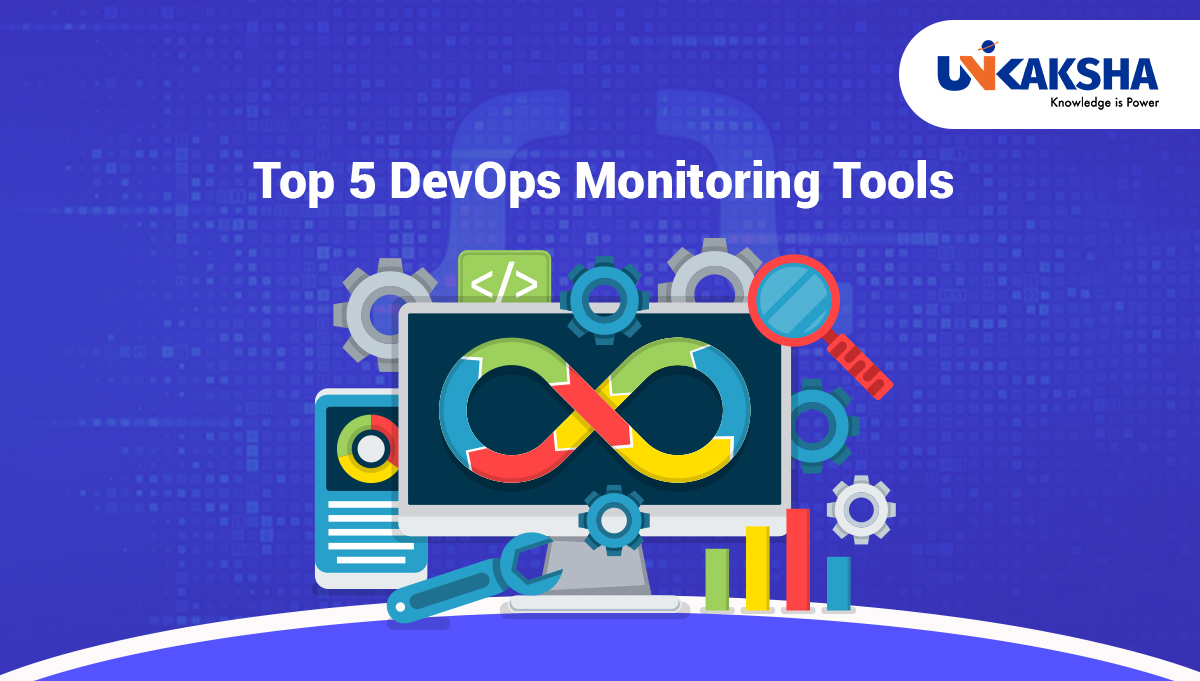Top 5 DevOps Monitoring Tools of 2022

DevOps involves the procedure of systematically monitoring of various aspects of development, starting from creating a strategy for the operation to performing the development from the integration of application and testing and everything from deployment to the operations. DevOps always aims to achieve continuous improvement of processes, better handling of resources, cost optimization, and quick delivery of finished products and can combine multiple best practices within the engineering domain for running successfully. Hence, DevOps requires the support and assistance of numerous engineers who can manage the operations for which they are needed inside an organization. DevOps need to be managed by a team of skilled automation engineers, platform engineers, data analysts, build and release specialists, product managers, and database engineers. Through DevOps, the engineers can have a real-time and comprehensive view of the infrastructure, services, and nature of the production applications.
By monitoring the DevOps, it is possible to enhance the development efficiency and allow the teams to come up with potential issues before releasing the code to production. The engineers working with DevOps can perform this through planning, developing, designing, evaluating, testing, deploying, and thoroughly reviewing some work within a specified period.
Importance of working on DevOps Monitoring
Using DevOps monitoring tools, the teams can anticipate and detect changes in the client experience and develop ways to resolve them. The developers can also use the DevOps monitoring tools to get back to some earlier stages of development to remediate some issues that they detect. In this way, problems can be easily detected and remedied automatically and manually as per the requirement with superior software implementation.
Various kinds of monitoring tools used in DevOps
- Server Monitoring
Server monitoring is a process sometimes referred to as infrastructure monitoring or resource monitoring. In this process, information is collected about the performance of a server and then analyzed. The server monitoring techniques offer detailed statistics on CPU loads, RAM consumption, and total disk space left. Through the methods used for server monitoring, users can aggregate the data from the virtual servers for the cloud-based scenarios.
- Application Performance Monitoring
The process of application performance monitoring helps measure the way an application or a service is performing. The tools used to evaluate the server performance. These tools totally function on their own to keep track of the metrics like completion and response time. Application performance monitoring is essential for ensuring application performance issues and problems are detected promptly so that the services can smoothly function as intended to do.
- Network Monitoring
With the process of network monitoring, it is possible to examine, detect and study the data coming in and out of the computer network. The monitoring tools used for network monitoring can help track the incoming requests and responses across the various components, starting from the firewalls and the switches to the servers.
Learn more about the How to become a DevOps Engineer in our blog post.
Top 5 DevOps Monitoring Tools
Here is a look at the top 5 DevOps Monitoring Tools that you can use for various functions.
- Sensu
Sensu is considered one of the finest DevOps monitoring tools that you can find in the market. The tool proves effective in monitoring diverse application solutions and infrastructure systems. You can easily monitor your business KPIs, infrastructure, and applications with Sensu. The great thing about Sensu is that it can combine static, dynamic, and temporary infrastructure for solving any glitches, difficulties, and challenges associated with the latest infrastructure platforms.
- Librato
Librato can help you track and comprehensively the metrics affecting the operations in your business at multiple levels of a stack in real-time. With Librato, you get to gain access to the numerous features that can help you monitor solutions and metrics, such as alerts, analyses, and visualizations. Librato makes it possible for users to transform the real-time data from practically any source.
- PagerDuty
PagerDuty works as a powerful operations performance platform meant to be used mainly by the operations staff for managing the performance and reliability of various apps. The tool can also help detect and resolve errors and issues as quickly as possible. As the tool provides alerts on any issues relating to development and production, it helps the operations teams to detect and resolve them quickly.
- Prometheu
Prometheus is a high-performance metrics-based and time-series database that helps with white box monitoring. The Prometheus tool functions as an open-source and community-driven system that can help monitor and alert, and it has a booming ecosystem. The great thing is that it is very user-friendly and support for its use is easy to avail.
- Tasktop Integration Hub
Tasktop integration hub can incorporate all the various tools in an organization within one single application to ensure optimum value to the business. The Tasktop Integration Hub works as a single-point solution for managing software delivery integration tasks and requirements without the need to use another tool. Working with this tool also simplifies the process.
DevOps Certification Courses by UniKaksha
Docker is revered as the most powerful DevOps tool to put apps into ‘containers’. These containers can be run by your laptop or on a server from anywhere across the world. Owing to this Docker is ideal for running distributed applications. The DevOps Docker Course will teach you Docker through a series of lectures and fun animations and conceptual illustrations
Course Content:
- Docker Overview
- Container & Container Image
- Container Importance
- Docker Installation on LINUX V.M
- Docker Installation on AWS EC2 Instance
- Docker Installation on Windows
- Docker Hub
- How to Pull Docker Image
- How to run Container
- Launch Multiple containers with Single image
- Docker Container Port Forwarding
Course Includes:
- 11 Lessons
- 11 Topics
- Medium: English
Enroll for the DevOps Docker Course today!
Learn Ansible – an open-source configuration management, application deployment and software provisioning tool. It is an automation engine to assist provisioning infrastructure, deploying applications and configuring operating systems. The DevOps Ansible Course will teach you to get started with Ansible for automation. After finishing this course, you’ll be able to create playbooks to automate basic tasks. This course is of great value to the DevOps professional.
Course Content:
- Overview of DevOps
- DevOps Road Map
- Ansible Overview
- Ansible Installation
- Ansible Lab Setup Part 1
- Ansible Lab Setup Part 2
- Managing Inventory file
- Working with Inventory file
- Working with Ansible ping Module
- Working with Ad-Hoc command
- Working With Command 2
- Writing a Playbook
- Ansible Playbook Execution
- Working with Ansible loop
Course Includes:
- 14 Lessons
- 14 Topics
- Medium: English
Enroll for the UniKaksha’s DevOps Ansible Course today!
Conclusion:
I hope, you are now well aware of the Top DevOps monitoring tools. How did you like the article? Feel free to share it with your friends and colleagues.
About the Author
Sonali is an accomplished Author, Content Writer, Copywriter, and Ghostwriter, known for her ability to create engaging and captivating communications. With over 11 years of experience, she has developed a diverse industry background in Education, Travel, Retail, Events, and Fashion . Quality over quantity is what she firmly believes in. At UniKakhsa, she leads a team of talented technical writers, dedicated to delivering valuable content to readers through our blogs.
 Related Posts
Related Posts
|
Offerings
|
FutureFirst
|
SmartStart
|
GradEdge
|
SelfMastery
|
|---|---|---|---|---|
|
Doubt clearing session
|
                                          |
                                          |
                                          |
                                          |
|
No of job opportunities
|
15 | 25 | 15 | 3 |
|
Course Access
|
5 Years | Lifetime | Lifetime | 5 Years |
|
Free Library Courses
|
                                          |
                                          |
                                          |
                                          |
|
Job Assurance
|
                                          |
                                          |
                                          |
                                          |
|
Language
|
English/Hindi | 5 Language options | English/Hindi | English/Hindi |
|
Live classes
|
100% | 100% | 100% |                     |
|
Offline
|
                                          |
                                          |
                                          |
                    |
|
Industry Expert Sessions
|
                    |
                                          |
                    |
                    |
|
Internship (IOP)
|
                                          |
Guaranteed | Guaranteed | Based on evaluation |
|
1:1 Mentoring sessions
|
                    |
                                          |
                    |
                    |
|
Customer Support
|
                                          |
                                          |
                                          |
                                          |
|
Dedicated Program Manager
|
                    |
                                          |
                    |
                    |
|
Opt for Placement services
|
Compulsary |                                           |
                                          |
                                          |
|
Career Support
|
1 Year | 18 Months | 1 Year | 3 Months |
|
Regular assessments
|
                                          |
                                          |
                                          |
                                          |
|
Report cards
|
                                          |
                                          |
                                          |
                    |
|
Career Guidance
|
                                          |
                                          |
                                          |
                    |
|
Certificates
|
                                          |
                                          |
                                          |
                    |
|
Scholarship
|
                                          |
Available | Available |                     |
|
Trial Class
|
1 week | 1 week | 1 week |                     |
|
Outside placement
|
Paid | Allowed | Allowed | Allowed |
|
Premium Jobs
|
                    |
                                          |
                    |
                    |
